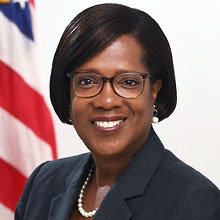SAMHSA, State Leaders Describe Collaborations to Address Social Determinants of Health
Abstract
The plenary speakers agreed that effective programming to address social determinants of health is dependent on collaboration across states and among physicians and organizations such as APA.
The federal government is committed to addressing social determinants of health (SDOH) and mental health in collaboration with states and communities, said Miriam E. Delphin-Rittmon, Ph.D., assistant secretary for mental health and substance use and administrator of the Substance Abuse and Mental Health Services Administration (SAMHSA).

We know there is a high degree of interdependence among the social determinants. If one area is off, it will affect overall health and well-being.—Miriam E. Delphin-Rittmon, Ph.D.
She made her remarks at the opening plenary session of APA’s virtual Mental Health Services Conference in October.
Delphin-Rittmon said SAMHSA has aligned its “pillars of mental health recovery”—health, home, purpose, and community—around five SDOH: neighborhood and the manmade structures in a neighborhood that create the environment people live and work in, social and community context, economic stability, education, and health and health care.
“We know there is a high degree of interdependence among these,” she said. “If one area is off, it will affect overall health and well-being. We know, for instance, that having access to high-quality mental health care isn’t enough if people lack access to education, housing, and transportation.”
Delphin-Rittmon outlined SAMHSA’s initiatives and priorities specifically targeting SDOH. Among these is the Resiliency in Communities After Stress and Trauma, which assists high-risk youth and families in communities impacted by civil unrest. This program offers violence prevention and community youth engagement programs, as well as linkages to trauma-informed behavioral health services. She also described the Food and Mood Project, which aims to promote emotional wellness and reduce the impact of mental health and substance use issues in the Midwest and mountain states through strategies—such as school gardens—that address the link between behavioral health and food or food insecurity, and/or cultural food diversity.
Also speaking at the plenary were Sonja Gaines, M.B.A., deputy executive commissioner for Intellectual and Developmental Disability and Behavioral Health Services at the Texas Health and Human Services Commission, and Keri L. Waterland, Ph.D., director of the Division of Behavioral Health and Recovery at Washington State Health Care Authority. Gaines and Waterland shared examples of several innovative projects in their states aimed at addressing SDOH. These efforts are funded by SAMHSA.
Gaines described four behavioral matching grant programs in the state supported by SAMHSA:
Mental Health Grant Program for Justice-Involved Individuals aims to reduce arrests, incarceration, and recidivism rates among people with mental illness and reduce the wait time for forensic commitments.
Community Mental Health Grant Program supports community mental health programs providing services and treatment for people with mental illness.
Healthy Community Collaborative helps people with recovery and reintegration within their communities by providing permanent housing and connecting them with support services such as mental health and substance use treatment and employment assistance. The Sandra Bland Act, passed by the state legislature in 2017, expanded the program to include community collaborative providers serving two or more counties with a population of less than 100,000 each.
Texas Veterans+Family Alliance helps clients with recovery and reintegration within their communities by providing permanent housing and connecting clients with support services such as mental health and substance use treatment and employment assistance.
Additionally, in May 2020 the state established the COVID-19 Mental Health Support Line. She said staff handled 18,400 phone calls and hosted virtual support groups for frontline health care workers.
Waterland similarly described SAMHSA-supported programs in Washington state addressing SODH. These include the Foundational Community Supports, which provides supportive housing and supported employment services to Medicaid beneficiaries. These services are designed to promote self-sufficiency and recovery by helping participants find and maintain stable housing and employment.
“Early findings show statistically significant improvements in employment rates, earnings, and hours worked, as well as a statistically significant increase in transitions out of homelessness,” Waterland said. “It has also shown promising reductions in outpatient emergency department and inpatient utilization among those enrolled in the program.”
The Wraparound with Intensive Services program is an approach to helping Medicaid-eligible children, youth, and their families in Washington state with intensive mental health care. Services are available in home and community settings and offer a system of care based on the individualized needs of the child or youth.
As in Texas, the state of Washington has instituted Washington Listens, a free and anonymous telephone counseling line providing nonclinical support to people who feel anxious or stressed because of COVID-19. At the Washington Listens website, individuals can also find in-person meetings or events for support regarding COVID-19 concerns.
All of the speakers emphasized that effective programming to address SDOH requires collaboration across many sectors. Delphin-Rittmon said, “We are here to be partners with APA and look forward to our ongoing collaboration addressing social determinants of health.” ■



